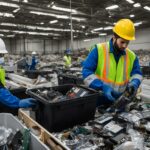The Future of IT Recycling: Predictions and Trends.
In an age where technology is evolving at an unprecedented rate, the question of what happens to outdated or discarded devices is becoming increasingly important. The Future of IT Recycling is not just a matter of environmental concern but also a topic of economic and ethical significance. As we continue to generate massive amounts of electronic waste, or e-waste, the need for effective and sustainable IT recycling methods is more pressing than ever.
The concept of IT recycling goes beyond merely disposing of old computers and gadgets. It encompasses a broader spectrum of activities, including data wiping, component reusability, and resource recovery. As we look to the future, emerging technologies and shifting consumer behaviors are set to redefine the landscape of IT recycling. This article aims to explore the Predictions and Trends that will shape the future of this critical aspect of sustainable technology management.
The Role of Emerging Technologies
Emerging Technologies are poised to redefine the landscape of IT recycling. Artificial Intelligence (AI) can be used to automate the sorting of e-waste, identifying materials that can be reused or recycled. Blockchain technology offers a secure and transparent way to track the lifecycle of electronic components, ensuring that they are responsibly recycled or disposed of. The Internet of Things (IoT) can be leveraged to monitor the condition of electronic devices in real-time, providing valuable data that can be used to extend their lifespan. These technologies not only make the recycling process more efficient but also add a layer of transparency and accountability. For a more comprehensive understanding of how technology is influencing e-waste management, you can refer to this E-waste Trends: High Tech and New Attitudes Fuel Advancement.
Consumer Behavior and Awareness
The Consumer Behavior and Awareness segment is crucial in determining the effectiveness of IT recycling programs. As awareness about the environmental impact of e-waste grows, consumers are becoming more responsible. They are not only more inclined to recycle their old devices but are also considering the sustainability credentials of brands when making new purchases. This shift in consumer behavior is likely to drive demand for more sustainable electronics, thereby influencing manufacturers to adopt greener practices.
Regulatory Changes and Policies
Regulatory Changes and Policies are another significant factor shaping the future of IT recycling. Governments worldwide are implementing stricter regulations to ensure responsible e-waste management. These policies often include stringent guidelines for data destruction, material recovery, and disposal methods. Non-compliance can result in hefty fines, making it imperative for companies to adopt sustainable practices. These regulations serve as a catalyst for change, pushing the industry towards a more responsible and sustainable future.
Challenges and Opportunities in IT Recycling
As we look towards the future, it’s essential to recognize both the challenges and opportunities that will shape The Future of IT Recycling.
Data Security Concerns
One of the significant challenges in IT recycling is ensuring Data Security. As devices become more interconnected and store increasing amounts of sensitive information, the secure deletion of data becomes a critical concern. Companies and individuals must be vigilant in wiping data before recycling devices to prevent unauthorized access.
Resource Scarcity
Resource Scarcity is another challenge that emphasizes the need for effective IT recycling. Many electronic devices contain rare earth elements that are becoming increasingly scarce. Effective recycling can help recover these valuable materials, reducing the need for new extractions and mitigating environmental impact.
Economic Viability
While the environmental benefits of IT recycling are clear, the Economic Viability of recycling programs is often questioned. However, as technology advances, recycling processes are becoming more cost-effective, turning this challenge into an opportunity for both businesses and consumers.
Technological Advancements
On the flip side, Technological Advancements offer numerous opportunities for improving IT recycling methods. Innovations in machine learning and automation can make the sorting and recycling process more efficient, while blockchain technology can provide a transparent tracking system for the lifecycle of electronic components.
Public Awareness and Education
Increasing Public Awareness and Education about the importance of IT recycling can drive consumer behavior towards more sustainable practices. Educational campaigns and community programs can play a significant role in promoting responsible e-waste management.
Actionable Steps for a Sustainable Future in IT Recycling
For Individuals
Educate Yourself
Being informed is the first step towards responsible behavior. Subscribe to newsletters, read articles, and follow organizations that focus on Sustainable Computing and IT Recycling. The more you know, the better choices you can make.
Proper Disposal
Don’t just throw away your old electronic devices. Locate certified E-Waste Recycling Centers in your area and ensure that your devices are disposed of responsibly. Some centers even offer monetary incentives for recycling.
Purchase Responsibly
When buying new electronic devices, look for products that have eco-friendly certifications. Companies are increasingly offering products that are designed to be more easily recycled, so make those your first choice.
For Businesses
Adopt Sustainable Practices
Create a comprehensive e-waste management policy that focuses on the 3Rs – Reduce, Reuse, Recycle. This could involve setting up recycling bins at the office or partnering with certified recycling centers for regular e-waste collection.
Data Security
Before recycling any business devices, ensure that all sensitive data is securely wiped. Employ professional data destruction services if necessary to prevent any data breaches.
Employee Training
Conduct regular training sessions to educate employees about the importance of IT Recycling. Make it a part of the company culture to ensure long-term adherence to sustainable practices.
For Governments
Stricter Regulations
Enforce laws that mandate responsible e-waste management. Regular inspections and penalties for non-compliance can serve as effective deterrents for irresponsible behavior.
Public Awareness Campaigns
Run nationwide campaigns to educate the public about the environmental and economic benefits of IT Recycling. Use various media channels to reach a broader audience.
Incentives for Businesses
Offer tax benefits, grants, or other incentives to businesses that demonstrate a commitment to sustainable e-waste management practices. This will encourage more companies to adopt responsible practices.
For Educational Institutions
Integrate into Curriculum
Incorporate modules on Sustainable Computing and IT Recycling into the educational curriculum. This will equip the next generation with the knowledge they need to make responsible choices.
Research and Development
Collaborate with tech companies and governmental agencies to research more sustainable methods of e-waste management. This could lead to breakthroughs that make the recycling process more efficient and cost-effective.
Campus Initiatives
Organize e-waste collection drives, seminars, and workshops to raise awareness among students and staff. Partner with local recycling centers to ensure that the collected e-waste is responsibly managed.
Frequently Asked Questions (FAQ) on The Future of IT Recycling
What Does the Future Hold for IT Recycling?
The Future of IT Recycling is expected to be shaped by technological advancements, consumer behavior, and regulatory changes. Emerging technologies like AI and IoT are making the recycling process more efficient, while increased public awareness is driving demand for sustainable practices.
How Can Emerging Technologies Impact IT Recycling?
Emerging Technologies like Artificial Intelligence, Internet of Things, and Blockchain are set to revolutionize IT recycling by automating sorting processes, ensuring secure data destruction, and providing transparent tracking of electronic components.
What Role Do Consumers Play in IT Recycling?
Consumer Behavior and Awareness are pivotal in shaping the future of IT recycling. As awareness about the environmental impact of e-waste grows, consumers are becoming more responsible in recycling their old devices and considering sustainability when making new purchases.
Are There Any Regulatory Changes Expected?
Yes, Regulatory Changes and Policies are being implemented worldwide to ensure responsible e-waste management. These policies often include stringent guidelines for data destruction, material recovery, and disposal methods, pushing the industry towards more sustainable operations.
What Are the Challenges in IT Recycling?
The main challenges include Data Security, ensuring the secure deletion of data from devices before recycling, and Resource Scarcity, as many devices contain rare earth elements that are becoming increasingly scarce.
Conclusion: Navigating the Future Landscape of IT Recycling
As we’ve explored in this comprehensive guide, The Future of IT Recycling is a multifaceted issue that involves technological advancements, consumer behavior, regulatory frameworks, and various challenges and opportunities. The increasing rate of e-waste generation makes it imperative for all stakeholders—be it individuals, corporations, or governments—to actively participate in shaping a more sustainable future for IT recycling.
Emerging Technologies like AI, IoT, and Blockchain offer promising avenues for making the recycling process more efficient and transparent. At the same time, shifts in Consumer Behavior and Awareness are driving demand for more sustainable electronic products, thereby influencing manufacturers to adopt greener practices.
Regulatory Changes and Policies are serving as catalysts, pushing the industry towards more responsible and sustainable operations. However, challenges like Data Security and Resource Scarcity still need to be addressed to ensure the long-term success of IT recycling initiatives.
In conclusion, while there are challenges to overcome, the opportunities for innovation and improvement are abundant. The Future of IT Recycling is not just an environmental necessity but also an economic and ethical imperative. By staying informed and making responsible choices, we can all contribute to a more sustainable and ethical approach to technology use and disposal.















